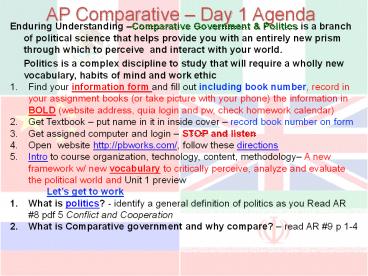AP Comparative - PowerPoint PPT Presentation
Title:
AP Comparative
Description:
AP Comparative Day 1 Agenda Enduring Understanding Comparative Government & Politics is a branch of political science that helps provide you with an entirely ... – PowerPoint PPT presentation
Number of Views:196
Avg rating:3.0/5.0
Title: AP Comparative
1
AP Comparative Day 1 Agenda
- Enduring Understanding Comparative Government
Politics is a branch of political science that
helps provide you with an entirely new prism
through which to perceive and interact with your
world. - Politics is a complex discipline to study that
will require a wholly new vocabulary, habits of
mind and work ethic - Find your information form and fill out including
book number, record in your assignment books (or
take picture with your phone) the information in
BOLD (website address, quia login and pw, check
homework calendar) - Get Textbook put name in it in inside cover
record book number on form - Get assigned computer and login STOP and listen
- Open website http//pbworks.com/, follow these
directions - Intro to course organization, technology,
content, methodology A new framework w/ new
vocabulary to critically perceive, analyze and
evaluate the political world and Unit 1 preview - Lets get to work
- What is politics? - identify a general definition
of politics as you Read AR 8 pdf 5 Conflict and
Cooperation - What is Comparative government and why compare?
read AR 9 p 1-4
2
Type pbworks.com in your browser.This screen
will appear click login
3
Click to sign up
4
Make sure to type your name
5
Please use your school email Last.F1234_at_student.cb
sd.org
6
Go to your email and wait for a message that
saysHi!To use this email address with PBworks,
please click this linkhttps//my.pbworks.com/ver
ify.php?emailmrcompgov40comcast.netNameaddress_at_e
mail.comidf63b762e9d0ec15d6b713c620e12f3df03a84e
eakey5fca8922Thanks,Your PBworks Team
7
After you click on the link in email this screen
will appear in your browserClick on
8
Type in mrksapcompgov
mrksapcompgov
Click submit
9
Click to request access
10
To
Check your email address and in the Message,
type your name
11
Go back to your email to find
Do this
12
Now we can start book mark this page in your
browser here and at home
13
(No Transcript)
14
(No Transcript)
15
Unit 1 -Introduction to Comparative
PoliticsTraining camp for the rest of the course
the rest of your life or how to bedazzle
friends enemies with high-falutin jargon in 17
not-so-easy days
- Why Government and Politics, arent they the
same thing? - What are the purposes (World Today) and methods
of comparison and classification and how are they
used? - Ways to analyze government and politics (ST chart
and component methods) - Normative and empirical analysis(see Wood 13
AR5i p 2) - What concepts like state, nation, regime,
government, etc, etc. (Bold words in Wood and
scroll through AR5i after p 5) will we need to
use? - Process and policy (what is politics, purpose of
government what are political science and
comparative politics common policy challenges) - What are the Big Challenges all political systems
are facing and how? Globalization (economics
too) and Democratization
16
- Need to study among other things
- Environment (political, cultural, geographical,
demographic, economic issues or problems) causing
need for public policies - Processes of making policies and putting them
into effect. - Actors involved in making and implementing policy
- Sources and methods of information used to make
policy - Environment in which policies are made
- Methods and biases in policy-maker selection
- Conflict and cooperation methods, prevalence,
role, actors - Systems structures influencing influenced by
policy-making - Therefore First - we will need to understand
the basics of political science. Then we will use
the College Boards Substantive Topic framework
to analyze and compare systems
17
Substantive Topics and AP Terminology
1. Sovereignty, Authority, Power, 2. Political Institutions 3. Citizens, Society State 4. Political and economic Change 5. Public Policy
Current Events Current Events Current Events Current Events Current Events
- Open text to p 13 renumber bullets i, ST1, ST4,
ST3, ST2, ST5
18
The Kleinogram
19
This is our class web page. How do we get here?
20
Type pbworks.com in your browser.This screen
will appear click login
21
Click to sign up
22
Make sure to type your name
23
Go to your email and wait for a message that
saysHi!To use this email address with PBworks,
please click this linkhttps//my.pbworks.com/ver
ify.php?emailmrcompgov40comcast.netNameaddress_at_e
mail.comidf63b762e9d0ec15d6b713c620e12f3df03a84e
eakey5fca8922Thanks,Your PBworks Team
24
After you click on the link in email this screen
will appear in your browserClick on
25
Type in mrksapcompgov
mrksapcompgov
Click submit
26
Click to request access
27
To
Check your email address and in the Message,
type your name
28
Go back to your email to find
Do this
29
Now we can start book mark this page in your
browser here and at home
30
Politics is the relationships between individuals
and groups, processes, actions and institutions
that make collective decisions. Usually these
are focused on answering the questions 1) Who
gets what (of scarce resources), when, where and
how? (another way of asking this is what should
govt do and how should it do it?) 2) Who gets to
decide and how does who get decided?
But politics are also the effects of the answers
to these questions Conflict arises over the
answers to the above two questions and politics
are also the management of these different, and
resultant conflicts
Therefore, if the above is an acceptable answer
to what is politics, then what conclusions can we
draw about what needs to be studied in order to
understand politics so that we can do comparative
politics?































